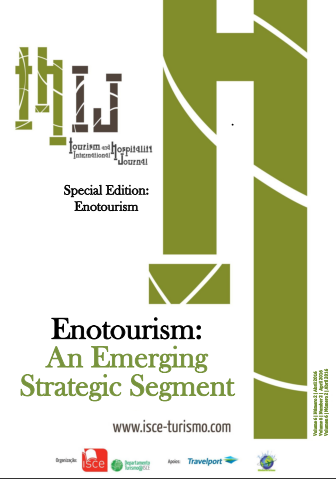Wine tourism as a rural development strategy. The case of the enotourism cluster in the department of Colonia-Uruguay.
DOI:
https://doi.org/10.57883/thij6(2)2016.30295Keywords:
Tourism, Rural Development, ClusterAbstract
The Department of Colonia (one of the nineteenth policy - administrative division of Uruguay) has an important tourism development, concentrated in the historical district of the provincial capital. Towards diversify tourism and in strengthening the departmental development framework arises wine tourism as an activity with potential. Therefore, in this paper, it is set to contribute to knowledge and promote the development of wine tourism cluster of the department, as strategy and instrument to promote rural development by identifying potential, brakes and implemented strategies. The study design was case study by qualitative analysis, in which 19 semi-structured interviews regarding the potential cluster actors performed. It corroborated the main working hypothesis, establishing the budding wine tourism cluster is composed of enterprises classified as "new" or "old", which operate independently with some coopetition could be considered the core of the cluster. The lack of articulation, coordination and projection of wine do not allow the acquisition of new proposals to complement the existing hindering their consolidation. The cluster may contribute to the development of the territory if articulates new proposals, and if it interacts with other actors, public or private land. To achieve the necessary interaction intends to conduct a participatory exploration of available resources, preparation of a development plan, including the creation of a seal of quality and the appointment of a coordinator for the plan, which will enable the continuation of the development proposal
References
Boschi, AM; García, MS. 2011. Nuevos productos turísticos: “Rutas del vino de la Patagonia en el Valle del Río Negro y Neuquén – Argentina”. Anuario de Estudios en Turismo – Investigación y Extensión. Facultad de Turismo – Universidad Nacional del Comahue Neuquén – Argentina. Año 11 - Volumen VII. [en línea] 8 de marzo de 2013. http://170.210.83.98:8080/jspui/bitstream/123456789/203/1/Articulo5_Boschi_Garcia.pdf
Castellanos Machado, C.; Castellanos Castillo, J. Elementos críticos para la evaluación del potencial de las regiones para la formación de clusters turísticos. Estudios de perspectivas turísticas [online]. 2013, vol.22, n.3 [citado 2015-04-29], pp. 450-472. Disponible en: http://www.scielo.org.ar/scielo.php?script=sci_arttext&pid=S1851-17322013000300005&lng=es&nrm=iso . ISSN 1851-1732
García Henche, B. 2005. Características diferenciales del producto turismo rural. Cuadernos de Turismo. Universidad de Alcalá de Henares. Madrid – España. Volumen (15), 113-133. [en línea]. 10 de abril 2015. http://dialnet.unirioja.es/servlet/articulo?codigo=1302242
http://revistas.um.es/turismo/article/view/18481/17831 Gilabert, D. 1989. Plan de estrategia de marketing para el turismo en España. Estudios turísticos, (104), 83-100. [en línea] 20 de octubre 2014. http://www.iet.tourspain.es/img-iet/Revistas/RET-104-1989-pag83-99-48476.pdf
Martínez López, J. 2004. Estratégicas y técnicas de investigación social. Universidad Mesoamericana. México. [en línea]. 20 de agosto 2014. http://www.geiuma-oax.net/sam/estrategiasmetytecnicas.pdf
Pastor, E. 2006. El turismo del vino, otra experiencia del ocio. Documentos del estudio del ocio. Universidad de Deusto Bilbao. Numero 30. [en línea] 6 de marzo de 2012. http://www.deusto-publicaciones.es/deusto/pdfs/ocio/ocio30.pdf
Porter, M. 1998. Clusters and the new economics of competition. Harvad business review [en línea]. New York. 20 de febrero 2015.
http://www.rimisp.org/wp-content/uploads/2012/07/31_rimisp_Cardumen.pdf Poon, A. (2003). Competitive strategies for a ‘new tourism’. Aspect of Tourism. Classic reviews in tourism. Edited by Chooper. pp 130-142. [en linea] 15 de marzo 2015 https://books.google.com.uy/books?hl=es&lr=&id=uB_ghXc1N1IC&oi=fnd&pg=P A130&dq=poon+tourism+technology+and+competitive+strategies&ots=hBNFzEqR
b&sig=dTd2XHcMg4ETOMzqAKW2OYTdWr0#v=onepage&q=poon%20tourism %20technology%20and%20competitive%20strategies&f=false
Riveros, H.; Blanco, M. 2003. El agroturismo, una alternativa para revalorizar la agroindustria rural como mecanismo de desarrollo local. Programa de Desarrollo de la Agroindustria Rural para América Latina y el Caribe (PRODAR). 33 p. [en línea] 18 de agosto de 2014. http://www.territorioscentroamericanos.org/turismorural/Documentos%20compartidos/El%20agroturismo,%20una%20alternativa%20para%20revalorizar%20la%20agroindustria%20rural.pdf
Silva Lira, I. 2003. Disparidades, competitividad territorial y desarrollo local y regional en América Latina. Serie 33 Gestión pública Comisión Económica para América Latina y el Caribe. [en línea] 10 de marzo de 2015. http://repositorio.cepal.org/bitstream/handle/11362/7286/S034200.pdf?sequence=1
Winesofuruguay. 2015. http://www.winesofuruguay.com/Turismo_Enologico
Downloads
Published
How to Cite
Issue
Section
License
Copyright (c) 2016 This work is licensed under a Creative Commons - Attribution 4.0 International (CC BY 4.0)

This work is licensed under a Creative Commons Attribution 4.0 International License.
This work is published under the Creative Commons Attribution 4.0 International License.






